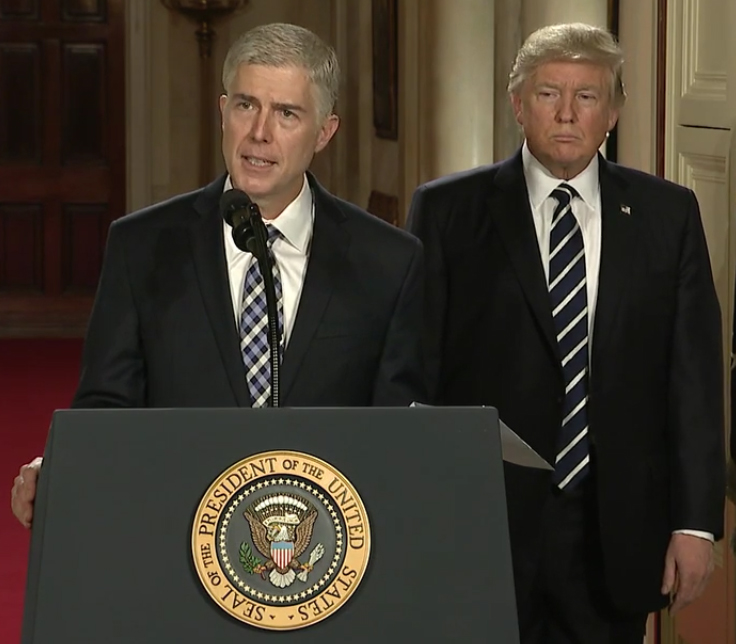Trump nominates Judge Neil M. Gorsuch to Supreme Court
Courtesy of Wikimedia Commons
President Donald Trump nominated Judge Neil M. Gorsuch to the Supreme Court, proposing a new justice to fill the year-long vacancy left behind by the late conservative, Justice Antonin Scalia. Gorsuch speaks at his nomination announcement.
February 23, 2017
In a highly anticipated announcement on Jan. 27, President Donald Trump nominated Judge Neil M. Gorsuch to the Supreme Court, proposing a new justice to fill the year-long vacancy left behind by the late conservative, Justice Antonin Scalia.
Gorsuch, 49, is currently a federal appeals court judge for the 10th circuit in Colorado and has often employed originalist reasoning in conservative decisions during his career. Originalism in the interpretation of the law involves a binding to the original understanding of the Constitution without taking into account national change over time.
In his decision, President Trump adhered to his campaign promise of appointing a conservative justice who takes after Scalia in personality, manner and legal philosophy. Republicans note the similarities between Gorsuch and the late Scalia, who was greatly admired by conservatives.
“As someone who’s taught government before, I’m a big believer in originalist thinking, that you take the Constitution as originally laid out and not reinterpret it based on current trends,” Thompson said. “I think [Gorsuch] is a phenomenal pick. He’s a conservative judge who is going to be in the mold of Antonin Scalia and is going to protect and defend the Constitution and not reinterpret it.”
In wake of the announcement, Democratic senators have expressed an intention for Gorsuch to face a gridlock in the confirmation process, similarly to Republican lawmakers’ decision to deny consideration to former President Barack Obama’s nominee, Merrick Garland. In response to the Democratic strategy going forward, President Trump told Senate majority leader Mitch McConnell of Kentucky to go “nuclear”, which would let McConnell lower the bar for confirmation votes from 60 to 51.
“My general opinion is that the Republicans were completely disrespectful to Obama in the last year of his presidency for not even having a hearing for Merrick Garland. [Gorsuch] is a conservative, and I am really worried about him rolling back rights for women and the LGBT community,” history teacher Andrea Milius said. “I do not know if the Democrats really have enough power to pull this [blocking attempt] off, so maybe they have to concentrate their efforts in a different way.”
As the law stands, Gorsuch needs 60 votes in the Senate with a filibuster threat and a simple majority, or 50 votes, without one. Republican lawmakers have stated their intent to confirm him by April; however, a prolonged battle of bipartisan gridlock looms on Capitol Hill.
This piece was originally published in the pages of The Winged Post on February 21, 2017.


















![“[Building nerf blasters] became this outlet of creativity for me that hasn't been matched by anything else. The process [of] making a build complete to your desire is such a painstakingly difficult process, but I've had to learn from [the skills needed from] soldering to proper painting. There's so many different options for everything, if you think about it, it exists. The best part is [that] if it doesn't exist, you can build it yourself," Ishaan Parate said.](https://harkeraquila.com/wp-content/uploads/2022/08/DSC_8149-900x604.jpg)




![“When I came into high school, I was ready to be a follower. But DECA was a game changer for me. It helped me overcome my fear of public speaking, and it's played such a major role in who I've become today. To be able to successfully lead a chapter of 150 students, an officer team and be one of the upperclassmen I once really admired is something I'm [really] proud of,” Anvitha Tummala ('21) said.](https://harkeraquila.com/wp-content/uploads/2021/07/Screen-Shot-2021-07-25-at-9.50.05-AM-900x594.png)







![“I think getting up in the morning and having a sense of purpose [is exciting]. I think without a certain amount of drive, life is kind of obsolete and mundane, and I think having that every single day is what makes each day unique and kind of makes life exciting,” Neymika Jain (12) said.](https://harkeraquila.com/wp-content/uploads/2017/06/Screen-Shot-2017-06-03-at-4.54.16-PM.png)








![“My slogan is ‘slow feet, don’t eat, and I’m hungry.’ You need to run fast to get where you are–you aren't going to get those championships if you aren't fast,” Angel Cervantes (12) said. “I want to do well in school on my tests and in track and win championships for my team. I live by that, [and] I can do that anywhere: in the classroom or on the field.”](https://harkeraquila.com/wp-content/uploads/2018/06/DSC5146-900x601.jpg)
![“[Volleyball has] taught me how to fall correctly, and another thing it taught is that you don’t have to be the best at something to be good at it. If you just hit the ball in a smart way, then it still scores points and you’re good at it. You could be a background player and still make a much bigger impact on the team than you would think,” Anya Gert (’20) said.](https://harkeraquila.com/wp-content/uploads/2020/06/AnnaGert_JinTuan_HoHPhotoEdited-600x900.jpeg)

![“I'm not nearly there yet, but [my confidence has] definitely been getting better since I was pretty shy and timid coming into Harker my freshman year. I know that there's a lot of people that are really confident in what they do, and I really admire them. Everyone's so driven and that has really pushed me to kind of try to find my own place in high school and be more confident,” Alyssa Huang (’20) said.](https://harkeraquila.com/wp-content/uploads/2020/06/AlyssaHuang_EmilyChen_HoHPhoto-900x749.jpeg)










